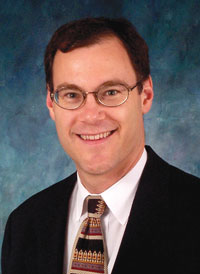 |
William Lydiatt, M.D. |
But it’s a daily reminder of what the 23-year-old has been through. It’s where doctors at The Nebraska Medical Center cut through, to get at the thyroid cancer, a butterfly-shaped gland located at the base of the neck.
Bauer was diagnosed two years ago after her family doctor noticed the right side of her throat was enlarged during an annual exam.
“You could actually see a lump (nodule) move when I swallowed,” Bauer said.
But the thought of cancer was far from her mind.
“I had never even heard of thyroid cancer,” she said. “Plus, I thought I’m way too young to get cancer.”
Bethany was just starting her senior year of college at the University of Nebraska-Lincoln.
“Doctors told me if you are going to get cancer, this is the best one to get,” Bauer said. “That helped calm my fears.”
Thyroid cancer occurs most often in women in the 20 to 45 age group and tends to be more aggressive when it develops in people older than 45.
“We hear a lot more about thyroid cancer today than ever before,” said William Lydiatt, M.D., surgical oncologist at The Nebraska Medical Center and division director of head and neck surgical oncology at UNMC. “That is part in due to the fact that the incidence of thyroid cancer has more than doubled in the past 30 years.”
While it is still not very common, approximately 35,000 new cases are expected to be diagnosed in the United State this year. September is thyroid cancer awareness month.
“The rise is being attributed, at least in part, to improved diagnostic techniques of previously undetected disease, although other unknown factors may also be at play,” Dr. Lydiatt said.
The outlook for thyroid cancer patients is very promising.
“It is one of the most treatable and curable cancers,” Dr. Lydiatt said. “Nintey-five percent of people with thyroid cancer will live a normal life expectancy especially if diagnosed at a young age.”
Papillary cancer is the most common type of the four different types of thyroid cancer.
“This type of cancer grows slowly so if caught early and before it spreads, the cancer can be completed removed with surgery,” Dr. Lydiatt said.
Anaplastic cancer is an extremely aggressive, rare form of thyroid cancer. It is likely what former Chief Justice William Rehnquist died from at the age of 80.
“It spreads rapidly to the lymph nodes and trachea, and then to other organs, especially the lungs and bone,” Dr. Lydiatt said. “For that reason, it’s often not curable surgically by the time it’s diagnosed.”
Most often, a person will not have signs and symptoms in the early stages of thyroid cancer. Some people may experience hoarseness or difficulty swallowing or have trouble breathing. Dr. Lydiatt, also a thyroid cancer survivor, said it was a lump (nodule) in the front of his neck, just below his Adam’s apple, that caught him off guard.
“We do recommend self-exams,” he said. “If you feel a lump in your neck and it moves up and down during swallowing, you should definitely talk with your doctor.”
Most thyroid cancers are, however, detected during a routine medical exam.
Surgery is the main type of treatment for thyroid cancer. During surgery doctors may remove half or the entire thyroid depending on the size and stage of the cancer. After surgery, radioactive iodine may be used to destroy any cancerous cells that have spread beyond the thyroid gland.
After any type of surgery for thyroid cancer, hormone medication is prescribed for life.
The medication has two benefits:
- It supplies the missing hormone the thyroid would normally produce, and
- It suppresses the pituitary’s production of TSH, which signals the thyroid to manufacture hormones. High TSH levels could conceivably stimulate any remaining cancer cells to grow.
Patients will have blood tests to check their thyroid hormone levels every few months until their doctor finds the proper dosage.
“Too much hormone can cause unintended weight loss, heart palpitations, anxiety, nervousness, tremors, osteoporosis and frequent bowel movements,” said Whitney Goldner, M.D., an endocrinologist at UNMC and The Nebraska Medical Center. “Too little may lead to slowed metabolism, fatigue, weight gain, difficulty concentrating, and dry skin and hair.”
For Rachel Culp, the hardest part of her treatment came after her surgery.
“I went back to work, but I felt like a zombie every day,” said Culp, who was 31 years old at the time.
She said Dr. Goldner helped her regulate her thyroid hormone medication, but during this process, she was extremely fatigued.
“Some people describe it as walking through molasses,” Culp said. “I couldn’t keep my thoughts straight or focus on anything.”
“It can take weeks to months to find the right hormone dose for a patient,” Dr. Goldner said.
Once the right dosage was discovered for Culp, she had much more energy and has returned to her normal routine.
There are few known risk factors for thyroid cancer. However, Dr. Lydiatt said the following factors are more likely to increase the risk for cancerous nodules:
- Being a young woman younger than 20;
- A woman older than 65;
- A man with nodules; and
- Having had radiation of the head and neck area during adolescence.
“Given the recent increase in the number of thyroid cancer cases, we are looking for additional factors that could contribute to the development of this cancer,” Dr. Goldner said.
Bethany Bauer said she’ll always wonder why she was prone to getting thyroid cancer.
“It was a rough road,” Bauer said. “Everyone encouraged me to take a year off of school, but the only way I could still qualify for health insurance was to stay in college. So, I basically went to classes and slept.”
With her family’s help and support, Bauer graduated in May and will start graduate school in January.